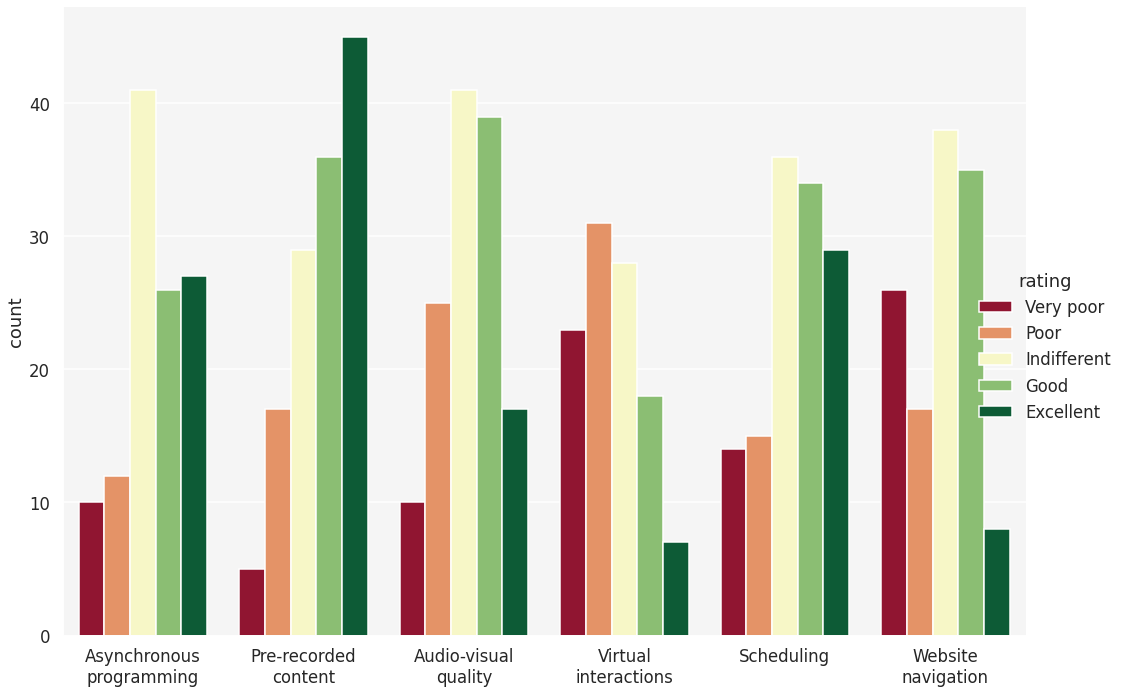|
It’s happened again. Summer (in the Northern hemisphere) has left us, and now we’re left with just memories of the balmier days of 2021. And with that, it’s a good time to reflect on the events of summer—and in particular OHBM2021. This was the second virtual edition of the annual OHBM meeting, with the online-only format offering unique challenges and opportunities. Considerable planning and effort from many teams of volunteers and OHBM staff members went into the development of the new platform—affectionately dubbed “Planet Brain” by past Chair Aina Puce. Leadership took the higher-risk path to work with a new-to-the-market and, critically, open-source vendor, Sparkle, in hopes of achieving a much more engaging virtual experience that captured more of the true OHBM meeting spirit. But how did you think it went? Here we summarize some results from the two surveys that were sent out, one to annual meeting attendees to gather information about their experience and another to OHBM members, whether they registered for the meeting or not, to find out their views on future meetings. We provide anonymized responses to the Annual Meeting Feedback survey, alternative visualizations, and an environment for their re-analysis at https://emdupre.github.io/ohbm2021-survey-feedback/ One important caveat about these results is their sample size: Only a small percentage responded to either of the two surveys. Of the 2,764 OHBM2021 registered attendees, 5.3% (147) returned comments. Similarly 2.9% of the 1,976 (57) current dues-paying OHBM members responded to the second survey. We did not ask for identifiable information, so we do not know the overlap between these two sets of respondents. This should be kept in mind as those providing feedback may not represent all the views of attendees or members. The annual meeting survey touched on different aspects of the event experience including how easy the virtual meeting website was to navigate, how suitable the scheduling of live events was, the quality of the audio/video experience for program sessions and pre-recorded content, and the asynchronous nature of the program. From the above summary figure, we see that accessing pre-recorded content had the highest proportion of positive responses, with 61% of respondents reporting a ‘Good’ or ‘Excellent’ experience. Conversely, the questions about interacting with speakers and other attendees and navigating the meeting website received the greatest number of ‘very poor’ (1) responses (21% of votes for both questions). These responses may reflect some of the well documented problems with Planet Brain, the annual meeting website. At the start of OHBM2021, there were performance issues with accessing the different rooms, although these were resolved midway through the meeting (as discussed here). These early challenges also impacted the ability to interact with both speakers and poster presenters. In free text comments, respondents liked the look of the website but again reported challenges with performance. The chat windows and opportunities for longer discussions were appreciated, as was the ability to access pre-recorded content. Another challenge was timing. Hosting a global conference that suits people in all timezones is, as we now know, extremely challenging. The start time was considered by some to be good for those from North America and Europe (although not those in Asia), but even with those from Europe (where the start time was 4pm, Paris) it was deemed challenging to fit with other commitments. The majority of respondents thought that the duration of the meeting was about right (5 days, as opposed to two weeks for OHBM2020). The vast majority of respondents reported that they attended all the days of the conference. A last major feature that almost, but didn’t quite, gel was the poster hall. Those who did interact with others in the poster hall reported it being a useful experience. The selection of symposia topics, speakers and roundtables was most commonly rated as ‘good’, as was the poster hall and poster highlight sessions. But we know from site visit data that many posters simply weren’t being viewed. This of course happens even in physical conferences (many of us have experiences of having time to get a quick coffee during our own poster sessions). But new strategies to boost visibility of virtual posters will likely be needed for future meetings. In summary, OHBM2021 was another voyage into the unknown of how to best host a virtual meeting. There were some definite positives to this approach. For example, being able to watch pre-recorded content in advance allowed the viewer additional time to prepare thoughtful questions for speakers during the Q&A. But technical teething trouble and challenges with networking certainly took part of the sparkle away. Despite these problems, the steep learning curve has ensured that next year's hybrid conference planning has much more experience to build upon, which we hope leads to a more productive, fruitful conference for all. Looking ahead, OHBM leadership needs YOUR feedback: Are you planning on attending the OHBM2022 hybrid Glasgow meeting? According to the survey results, 80% of the respondents want to travel to Glasgow. How about you? Will you be attending in person or virtually? If so, let us know using the survey question in the righthand blog sidebar.
0 Comments
Your comment will be posted after it is approved.
Leave a Reply. |
BLOG HOME
Archives
January 2024
|

 RSS Feed
RSS Feed